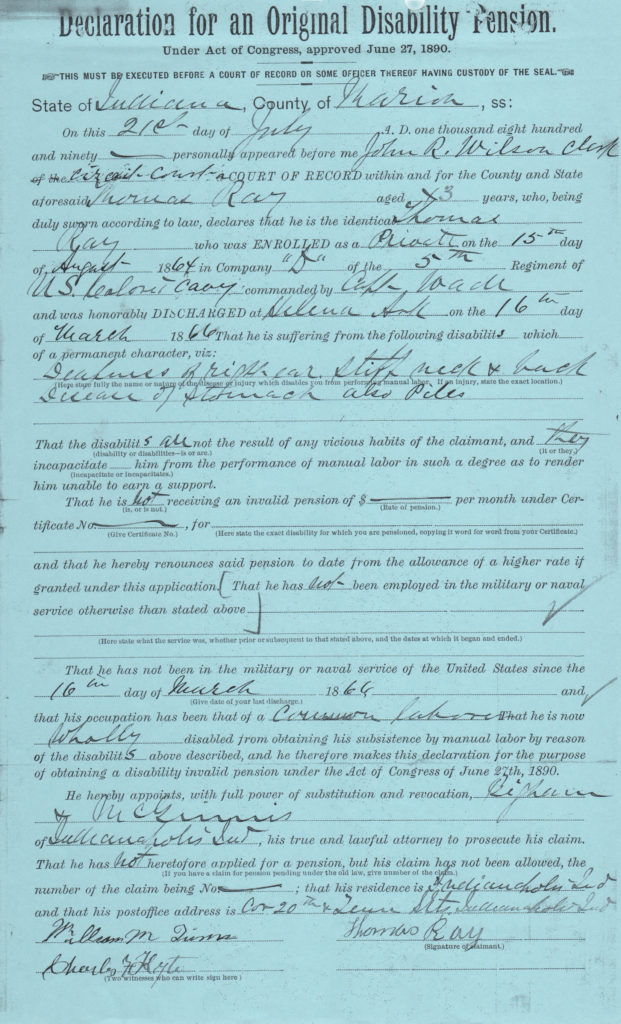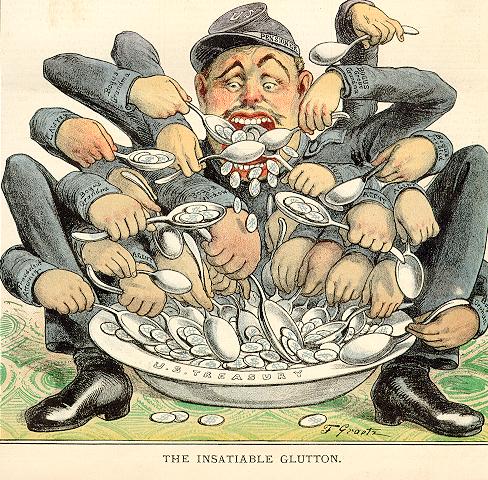As I went through Thomas Ray Allen’s pension file, I wondered why it was so difficult for him to get his pension raised when his medical reports showed how debilitated he was. There were those who thought that many of the veterans were not really in need of their pension money, that it was a drain on the Federal coffers.
I have shared some quotes below with some of the hows and whys of this state of affairs. After reading about Arthur Bull, another Civil War Veteran trying to get his pension, on the blog Molly’s Canopy, I realized that Thomas was fortunate in not having to travel long distances to a doctor as some of the rural veterans did.

“The Dependent and Disability Pension Act was passed by the United States Congress (26 Stat. 182) and signed into law by President Benjamin Harrison on June 27, 1890. The act provided pensions for all veterans who had served at least ninety days in the Union military or naval forces, were honorably discharged from service and were unable to perform manual labor, regardless of their financial situation or when the disability was suffered. The bill was a source of contentious debate and only passed after Grover Cleveland had vetoed a previous version in 1887.” From Wikipedia, the free encyclopedia Dependent and Disability Pension Act
“The biggest single change to the pension system came in 1890 with the Dependent Pension Act. Because most veterans did some kind of manual labor to support themselves and their families, and their ability to do so declined over time, political pressure for more help increased (as did the public pleading and private, desperate letters). The 1890 Act expanded eligibility to veterans who were disabled and unable to do manual labor even if that disability was not a direct result of the war. They just had to have served ninety days and been honorably discharged. The result was a huge increase in expenditures and numbers of veterans receiving a pension. More than a million men were on the pension rolls by 1893 and pensions ate more than 40% of the federal government’s revenue. One of the side effects of this legislation was a large number of men transferring their pensions from their previous disability pensions to these new service pensions because the new pensions paid more.” Civil War Pensions by Kathleen L. Gorman

“Those pensioners most often labeled as frauds were widows, especially young women who had married veterans much older than themselves, supposed “cowards,” and, in the Federal system, black veterans.” Civil War Pension…
That’s interesting.
—–
Eva – Mail Adventures
Uhhhhh. Seems like people don’t change much. They won the war, but they were treated awfully because they needed financial help. Go figure.
The Multicolored Diary: WTF – Weird Things in Folktales
Really seems like fashions change but people remain pretty much the same down through the generations.
40% of the federal revenue? That’s insane. Still, the fact remains the same 100 years ago as it does today – if you ask these men (and today, women) to put their lives on the line for your country, then you owe them something in return. You like the rights and freedoms? Well, that means you have to pay for them, in one way or another.
This was before income tax, so I assume the federal revenue was a lot lower, proportionally, than it is today.
Thanks for the blog mention! You are so right about Civil War veterans’ declining ability to do manual labor. My ancestor Arthur Bull’s health steadily declined due to lingering health effects from his Union Army service — and as a tanner, he just could not keep up. Yet he was put through hoops, just like Thomas Allen, to try to claim the pension benefits he needed to support himself and his family.
It’s really sad and something I hadn’t really thought about before, how people, especially those with no children or other family, support themselves as they aged and were unable to do the hard physical labor they had done all of their lives.
I feel sometimes they make it very hard to claim social security to save money 🙁
Social security and just about any other support type of payment, even though the money comes from the same people when they are or were able to pay taxes.
So, the problem was that the bill was not well-thought out? Because so many people fell into the requirements, then many that had the right to the pension had to fight to actually receive it?
@JazzFeathers
The Old Shelter – 1940s Film Noir
It sounds like they did not think through that the more time passed, the more people were going to need the pensions and they would need more money coming in to support that.